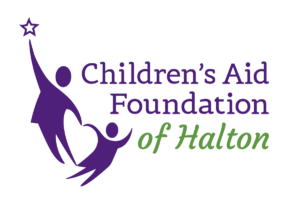When Cassandra was only three years old, she and her siblings were removed from their family and put into the care of Halton Children’s Aid Society (Halton CAS). First, she lived in foster homes with her siblings but later, she was moved without them to other foster homes and group homes, ageing out of care at 18. In no way was Cassandra’s journey easy, and it’s had a lasting impact. She’s become a warrior for other children and youth facing similar trauma, and she’s also built an ongoing, strong and positive bond to the Children’s Aid Foundation of Halton (CAFH). Cassandra has found happiness as an adult, and she’s determined to pay it forward.
Cassandra is an Ambassador for CAFH, and she’s also a veteran of two different roles. The first was when she was only 17 and still in high school, she became a Youth in Care worker within Halton CAS. Now, she’s a Transitional Youth Worker with Bridging the Gap, a program supported with funding from the CAFH.
Within Bridging the Gap, Cassandra supports youth between the ages of 16-24 who are homeless or at risk of becoming homeless. “Most of my clients are 16 to 18. They may have been kicked out of their homes or they may have been couch-surfing. I help them in any way I can, connecting them to agencies and youth shelters. In my job, I see all the marks of a traumatic childhood. Young people supress their emotions just to survive. This comes out in behaviours that indicate they’re struggling physically or mentally, such as with addictions. We deal with much more than finding them a place to sleep. I build a connection and keep in touch, often daily.”
“When we put our youth at risk, their lives are untethered. Housing is one of the most important things to give stability. You can’t focus on anything else if you don’t have a safe place to stay. It’s just terribly hard for the majority of kids. Some yell and scream but based on the trauma, that makes sense. If you understand, you don’t give up. I need to have lots of patience, because my goal is to be their anchor so they can pull themselves up.”
She admits that her own experiences give her a unique connection point, but that doesn’t mean she always talks about it. “If it’s appropriate I divulge, but not always. It’s about how to help them. We’re all different.”
Cassandra thinks about generosity a lot. She’s both a college and university graduate, and it is donations from CAFH’s donors that made that possible. “CAFH basically funded my life,” she says. “If I have a dream, it’s to become a millionaire so I can become the Foundation’s biggest donor.” She adds, “There’s an appalling, disgusting shortage of housing, and we get at least 500 calls a year. Funding is so important. Shortages also lead to low staffing, which leads to extraordinary pressure on case workers which leads to burnout.”
Looking back, she’s grateful on many levels. “I was the child battling poverty and family disfunction. I was that angry teenager, and they still hired me, they stuck by me. They really cared. I want to enjoy my life, and now that’s possible.” Because she took the opportunities that were offered to her, she’s now in a position to mentor children and youth, and also some of her friends who were in care alongside her.
“You can create your own happiness,” she says. Cassandra certainly has done that, but generosity and the opportunities it creates also help. If you wish to make a donation to CAFH for Bridging the Gap or any other program within CAFH, please reach out.

